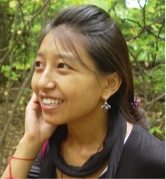Profile: Drolma Tsering
By Rick Bartoldus
Drolma Tsering is a graduate of Kent State University’s Masters of Cultural Foundations program from Lhasa, Tibet. It is still uncommon for Tibetans like to study abroad, but through hard work and determination she was accepted to Kent State University’s masters program through their partnership with Shanghai International Studies University, where she earned her bachelor’s degree in International Education.
Drolma Tsering is a graduate of Kent State University’s Masters of Cultural Foundations program from Lhasa, Tibet. It is still uncommon for Tibetans like to study abroad, but through hard work and determination she was accepted to Kent State University’s masters program through their partnership with Shanghai International Studies University, where she earned her bachelor’s degree in International Education.
Why she studies education:
Drolma has always had a commitment to service, which she states is due to the influence her parents had on her. “My parents always tried to help their local community, and by doing so they taught me to care deeply about helping those around me.” As Drolma studied in college, she learned more about the reality of the educational divide that she had lived through and that continues to influence rural Tibetans. She remembers in particular a trip she and her friends took to volunteer in a rural Tibetan school. “Seeing the educational conditions in this school made me think of schools in more remote areas all over the Tibet. I am sure that the educational conditions are worse in those places. There are more schools like that, but sadly most of us don’t realize it. I think that more effort needs to be made to improve the teaching condition and the quality in Tibet, especially in rural areas.” Her commitment to service merged with her analysis of the problem, and she decided that “education is how I hope to help those around me.”
Her path was not easy though, and there were times that she felt discouraged, but in the end her spirit and commitment to service triumphed over adversity. When asked how she pushed through the hard times, she responded that she would often re-watch her favorite Bollywood movie, Taare Zameen Par (Like Stars On Earth).“The movie has a very good message about education. Whenever I was feeling discouraged in school, I would watch this movie and remember that one teacher can make a difference, and poor performance in school does not necessarily mean that you are bad, it means that you have untapped potential. I often think of this when I talk about educational divides.”
How she got involved with Machik:
During her masters program, Drolma started researching the NGOs that operate in Tibet. Machik stood out to her due to the success of the Chungba Schools. “As someone who went to 3 different elementary school in different areas in Lhasa, and understands the educational conditions in rural areas in Tibet, the amount of success that the Chungba Schools enjoyed impressed me.” At the time, Drolma was not thinking about working with Machik, but as she approached the end of her master’s degree she decided that an internship would provide a nice finishing touch to her experiences in the USA. “When I was looking at places to intern, I remembered Machik. As I looked more into it, I became more enamored with their work.” She sent in her application, and Machik was happy to have a successful young Tibetan women like herself on the team.
What drew her to Machik:
The success of the Chungba Schools was the main appeal for Drolma, but as she researched Machik more she found many other programs that she liked. One of these programs, the Summer Enrichment Program (SEP), aims to provide rural Tibetan youth a unique opportunity of learning and engagement by promoting intercultural exchange among Tibetan, Chinese, and global youth. “It is very important for Tibetans to have the opportunity to communicate with the people from the outside world. I know that as a young Tibetan, most of us are curious and dream about the outside world. SEP brings the dreams closer to us. I think that if you don’t have contact with the outside world, you don’t think about trying to get out there to see it for yourself one day, and you start thinking that doing so is impossible. SEP’s main appeal is the inspiration it gives.”
Why is this work important to her:
“Machik is particularly important to me because of its sustainability.” She elaborated that many groups working in Tibet end up disappearing after a few years, and it hinders their accomplishments, but more importantly it limits their visibility in the Tibetan community. “Back home none of my friends are working in NGOs, because there is lack of access to these NGOs, and I hear that very few stay around long enough for us to even remember their names. A lot of young Tibetans are full of courage to help their community, but there is a lack of information, paths, and guidance to do service work. Machik bring more opportunities for young Tibetans to interact with and learn about the outside world, it would help unlock the potential of today’s youth.”
Her plans for the future:
Drolma will continue interning with Machik until December. She then plans on taking a 6 week long vacation to try and see as much of the USA as possible before returning to Tibet to start a career. She is going to focus her efforts on education-based civil work, but states that her number one goal is to “try my best to do good things in Tibet.
Drolma has always had a commitment to service, which she states is due to the influence her parents had on her. “My parents always tried to help their local community, and by doing so they taught me to care deeply about helping those around me.” As Drolma studied in college, she learned more about the reality of the educational divide that she had lived through and that continues to influence rural Tibetans. She remembers in particular a trip she and her friends took to volunteer in a rural Tibetan school. “Seeing the educational conditions in this school made me think of schools in more remote areas all over the Tibet. I am sure that the educational conditions are worse in those places. There are more schools like that, but sadly most of us don’t realize it. I think that more effort needs to be made to improve the teaching condition and the quality in Tibet, especially in rural areas.” Her commitment to service merged with her analysis of the problem, and she decided that “education is how I hope to help those around me.”
Her path was not easy though, and there were times that she felt discouraged, but in the end her spirit and commitment to service triumphed over adversity. When asked how she pushed through the hard times, she responded that she would often re-watch her favorite Bollywood movie, Taare Zameen Par (Like Stars On Earth).“The movie has a very good message about education. Whenever I was feeling discouraged in school, I would watch this movie and remember that one teacher can make a difference, and poor performance in school does not necessarily mean that you are bad, it means that you have untapped potential. I often think of this when I talk about educational divides.”
How she got involved with Machik:
During her masters program, Drolma started researching the NGOs that operate in Tibet. Machik stood out to her due to the success of the Chungba Schools. “As someone who went to 3 different elementary school in different areas in Lhasa, and understands the educational conditions in rural areas in Tibet, the amount of success that the Chungba Schools enjoyed impressed me.” At the time, Drolma was not thinking about working with Machik, but as she approached the end of her master’s degree she decided that an internship would provide a nice finishing touch to her experiences in the USA. “When I was looking at places to intern, I remembered Machik. As I looked more into it, I became more enamored with their work.” She sent in her application, and Machik was happy to have a successful young Tibetan women like herself on the team.
What drew her to Machik:
The success of the Chungba Schools was the main appeal for Drolma, but as she researched Machik more she found many other programs that she liked. One of these programs, the Summer Enrichment Program (SEP), aims to provide rural Tibetan youth a unique opportunity of learning and engagement by promoting intercultural exchange among Tibetan, Chinese, and global youth. “It is very important for Tibetans to have the opportunity to communicate with the people from the outside world. I know that as a young Tibetan, most of us are curious and dream about the outside world. SEP brings the dreams closer to us. I think that if you don’t have contact with the outside world, you don’t think about trying to get out there to see it for yourself one day, and you start thinking that doing so is impossible. SEP’s main appeal is the inspiration it gives.”
Why is this work important to her:
“Machik is particularly important to me because of its sustainability.” She elaborated that many groups working in Tibet end up disappearing after a few years, and it hinders their accomplishments, but more importantly it limits their visibility in the Tibetan community. “Back home none of my friends are working in NGOs, because there is lack of access to these NGOs, and I hear that very few stay around long enough for us to even remember their names. A lot of young Tibetans are full of courage to help their community, but there is a lack of information, paths, and guidance to do service work. Machik bring more opportunities for young Tibetans to interact with and learn about the outside world, it would help unlock the potential of today’s youth.”
Her plans for the future:
Drolma will continue interning with Machik until December. She then plans on taking a 6 week long vacation to try and see as much of the USA as possible before returning to Tibet to start a career. She is going to focus her efforts on education-based civil work, but states that her number one goal is to “try my best to do good things in Tibet.


